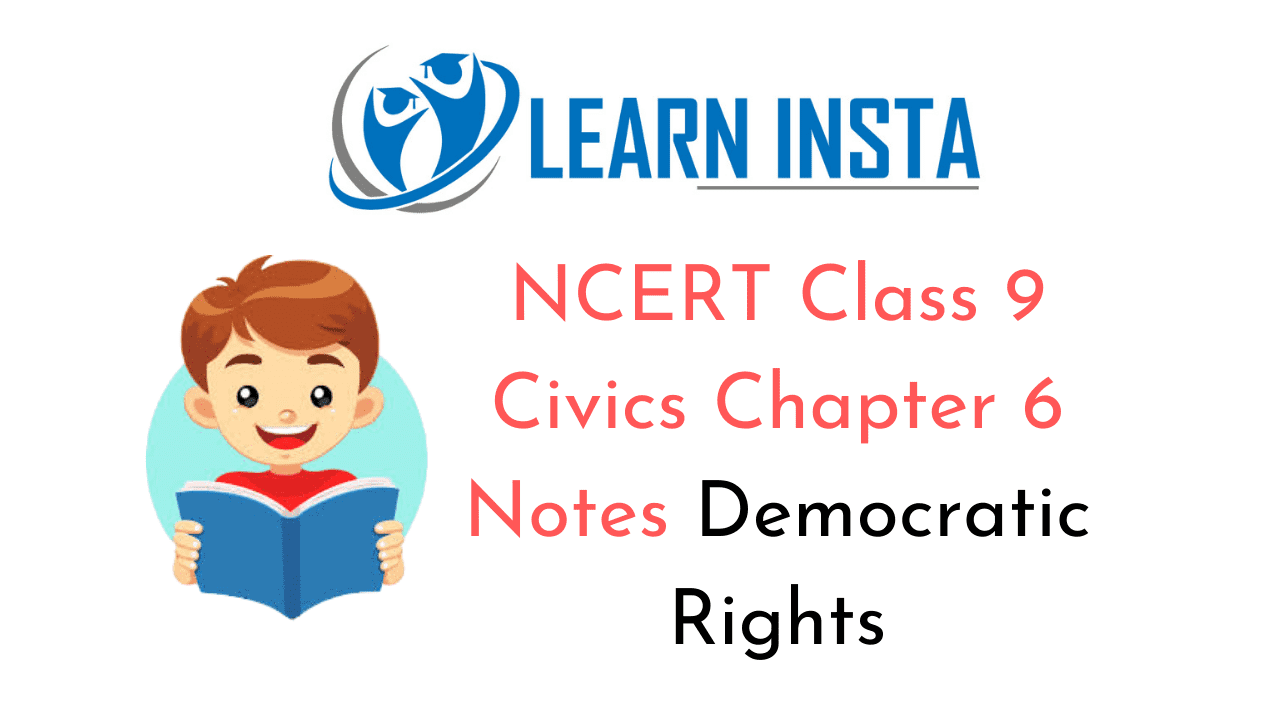
On this page, you will find NCERT Class 9 Civics Chapter 6 Notes Pdf free download. CBSE Class 9 Social Science Notes Civics Chapter 6 SST Democratic Rights will seemingly, help them to revise the important concepts in less time.
Democratic Rights Class 9 Notes Social Science Civics Chapter 6
CBSE Class 9 Civics Chapter 6 Notes Understanding the Lesson
1. Elections and institutions are major elements of a democratic government, no doubt, but if these two elements are combined with a third element called enjoyment of rights, the government becomes more democratic.
2. Citizens democratic rights are important and they should not be violated in any circumstances. We need rights because we cannot lead a smooth life without them.
3. All of us want to live happily, without fear and without being subjected to degraded treatment. For this we expect others to behave in such a way that does not harm us or hurt us. Equally, our actions should not harm or hurt others. So a right is possible when one makes a claim that is equally possible for others.
4. Rights have to be recognized by the society we live in. What is recognized by the society as rightful becomes the basics of rights.
5. When the socially recognized claims are written into law they acquire real force and they become enforceable. We can then demand their application. When fellow citizens or the government do not respect these rights we can approach courts to protect our rights.
6. A democracy can run smoothly if its citizens have certain rights, such as the right to vote, the right to be elected to government, etc.
7. Rights also protect ministries from the oppression of majority. They ensure that the majority cannot do whatever it likes.
8. It is the duty of the government to protect the citizens’ right. But sometimes elected governments may not protect or may even attack the rights of their own citizens. That is why some rights are placed higher than the government, so that the government cannot violate them.
9. In India, like most other democracies in the world, the basic rights of the citizens are written down in the Constitution. Some rights which are fundamental to our life are given a special status and are called Fundamental Rights.
10. Our Constitutions provides for six Fundamental Rights—Right to Equality, Right to Freedom, Right to Freedom of Religion, Right against Exploitation, Cultural and Educational Rights and Right to Constitutional Remedies.
11. These are the rights that are essential for an individual to develop his or her personality and lead a life with dignity. These rights are important for the very sustenance of a democracy. If people are not free and equal they cannot enjoy their Fundamental Rights.
12. The Fundamental Rights in the Constitution are important because they are enforceable. We have the right to seek the enforcement of these rights. This is called the Right to Constitutional Remedies. This itself is a fundamental right and makes other rights effective.
13. Fundamental rights are guaranteed against the actions of the Legislatures, the executive and any other authorities instituted by the government. There can be no law or action that violates the Fundamental Rights.
14. The Supreme Court and High Courts have the power to issue directions, orders or writs for the enforcement of the Fundamental Rights. They can also award compensation to the victims and punishment to the violators.
15. In recent years anyone can approach the courts if public interest is hurt by the actions of government. This is called Public Interest Litigation (PIL). Under the PIL any citizen or group of citizens can approach the Supreme Court or a High Court for the protection of public interest against a particular law or action of the government.
16. Apart from the Fundamental Rights, our Constitution and law offers many other rights too like Right to Freedom of Press, Right to Information and Right to Education.
17. Now school education has become a right for Indian citizens. The governments are responsible for providing free and compulsory education too all children up to the age of 14 years.
18. Recently the Supreme Court has expanded the meaning of the Right to Life to include the Right to Food. Our Constitution provides many more rights, which may not be Fundamental Rights. For example, Right to Vote in elections is an important Constitutional right.
19. With the expansion of democracy all over the world, the scope of rights has expanded. The Amnesty International is an organization that brings out independent reports on the violation of Human Rights all over the world.
Democratic Rights Class 9 CBSE Notes Important Terms
Right: Reasonable claim of a person recognised by society and sanctioned by law.
Claim: Demand for legal or moral entitlements a person makes on fellow citizens, society or the government.
Amnest International: An International Human Rights organization that brings out independent reports on the violation of Human Rights all over the world.
Trafficking: Selling and buying of men, women or children for immoral purposes.
Dalit: A person who belongs to the castes which were considered low and not touchable by others.
Ethnic group: A human population whose members usually identify with each other on the basis of a common ancestry.
Writ: A formal document containing an order of the court to the government issued only by High Courts or the Supreme Courts.
Summon: An order issued by a court asking a person to appear before it.
Covenant: Promise made by individuals, groups or countries to upload a rule or principle. It is legally binding on the signatories to the agreements or statement.